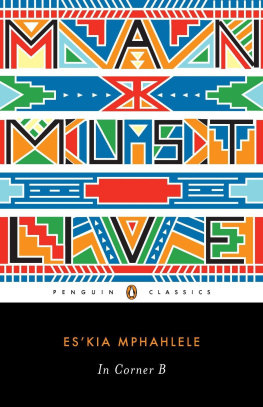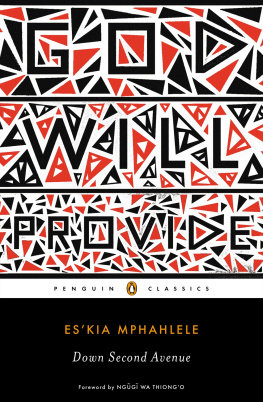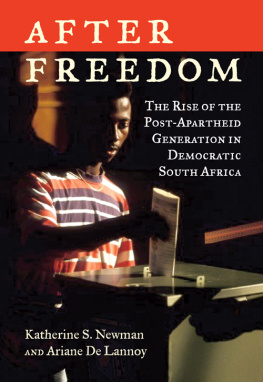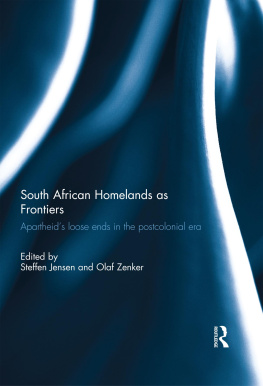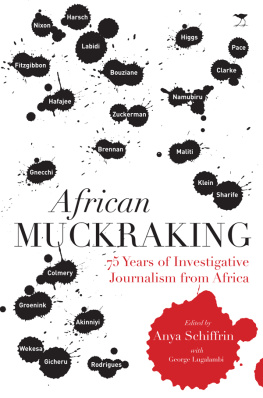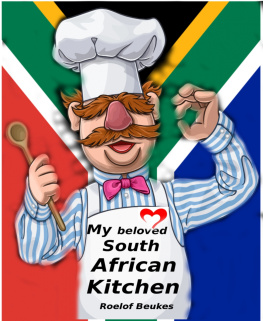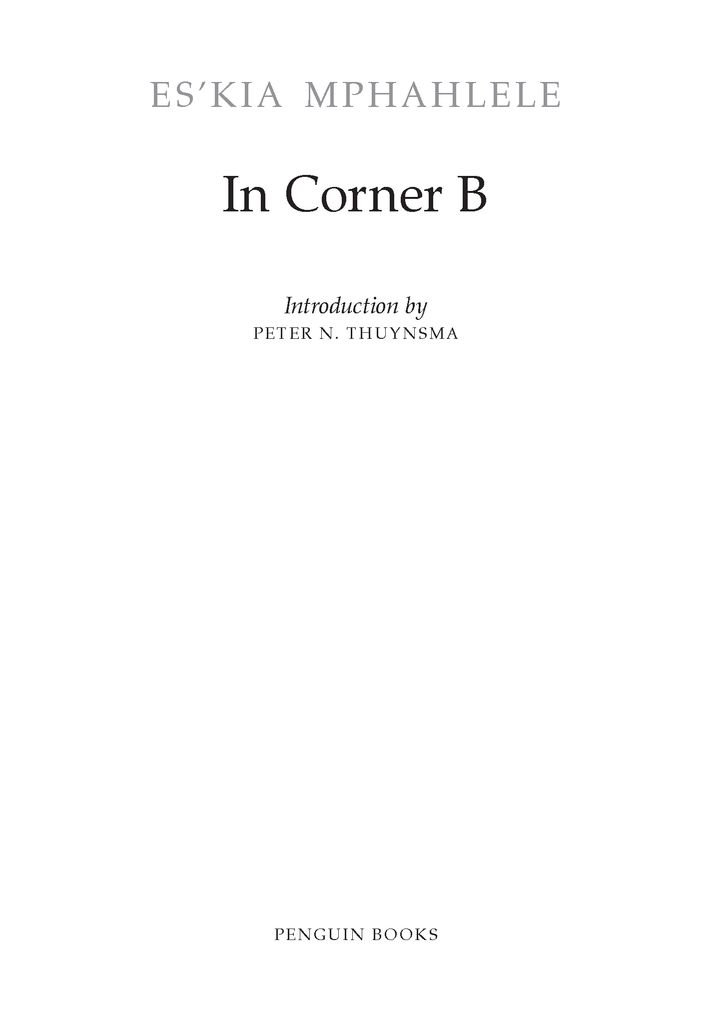Table of Contents
IN CORNER B
ESKIA MPHAHLELE was born Ezekiel Mphahlele on December 17, 1919, in Marabastad, outside of Pretoria. Raised by his paternal grandmother in the rural Northern Transvaal (now the Limpopo Province) near Pietersburg (now Polokwane), in the village of Maupaneng, Mphahlele returned to Pretoria as an adolescent, only to be called backward by teachers and his extended family. Despite these obstacles, Mphahlele excelled and earned his teachers certificate from Adams College, Natal, in 1940. He taught English and Afrikaans at Orlando High School in Soweto and, while teaching, published his first collection of short stories, Man Must Live (1947). In 1952, he was banned from teaching for campaigning against the Bantu Education proposals. Forced out of the profession, Mphahlele began working for Drum, a groundbreaking South African magazine; but soon became frustrated by the oppressive intellectual environment in South Africa and entered a brief exile in Basutolandtodays Kingdom of Lesothoin 1954. He later went to Nigeria, then France, then Kenya, then Zambia, and finally to the United States, where he stayed until 1977. While abroad, he became well-known for his anti-Apartheid activism and literature, publishing his autobiography and South African classic Down Second Avenue (1959). He would go on to write one more autobiography, Afrika My Music (1984), and three novels, The Wanderers (1971), Chirundu (1980), and Father Come Home (1984), in addition to his short stories and nonfiction. In 1978, he returned to his native South Africa and changed his name to Eskia, a reflection of his ongoing struggle with exile and identity. In 1986, the French government bestowed on him its Ordre des Palmes Acadmiques, recognizing his contribution to French language and culture. In 1998, South African president Nelson Mandela awarded him the Order of the Southern Cross. He died on October 27, 2008.
PETER N. THUYNSMA succeeded Eskia Mphahlele as professor of African Literature at the University of the Witwatersrand,
Johannesburg. A native of South Africa and leading scholar on Mphahlele, he received his PhD in English from the University of Denver, where he studied under Mphahlele. He has written extensively on African literature and directed and founded groups such as the Council for Black Education and Research and the Institute for Human Rights Education. He currently heads the Department of Institutional Advancement at the University of Pretoria.
Introduction
Man Must Live and Mrs Plum are stories that appear to bracket Mphahleles corpus as theme and as metaphor. The former is a political imperative, and the latters reference to the age-old wisdom of who sees what through a keyhole are, for me, the contextual fundamentals of Mphahleles short stories. Man Must Live is the unmistakable driver, while the keyholes panoramic one-way view of the human theater that is Apartheid South Africa supplies the perspective. Both are also intrinsically universal to anything discriminatory, bigoted, and prejudiced, further propelling the validity of Mphahleles work beyond his native land.
Despite reading and teaching many of these stories more than fifteen years ago, I still enjoy the irresistible excitement that their titles trigger. Many unleash a warm appreciation for Mphahleles craft as quickly as it wells up ones resentment for the Black-White encounter that was South African life under Apartheid. For readers who come to Mphahlele for the first time, here is a spectrum of the warp and weft of being Black under legislated prejudice. Here one will find the Black South African sensibility at its most observant, at its most prescient. Here one sees anger, hurt, resolve, confusion, and humiliationall harnessed in compelling frames. And we can excuse those readers who may come to an anthology like this expecting simply a set of community tales laced with catchy African sayings or expecting a quaint vocabulary. Instead you will find compelling tales of the racial encounter in exquisite understatement and driven along by delightful turns of phrase.
This is also much more than an anthology of tales. Two short essays serve as short autobiographical introductions, and in The Unfinished Story, Mphahlele wrestles with what he should write about, eventually commenting:
There must surely be much more to be said than the mere recounting of an incident: about the loves and hates of my people; their desires; their poverty and affluence; their achievements and failures; their diligence and idleness; their cold indifference and enthusiasm; their sense of the comic; their full-throated laughter and their sense of the tragic with its attendant emotional sobs and ostentatious signs of pity.
These are indeed universal human traits and their contrasts set the scene for the frescoes of life Mphahlele captures in each story. Here they all swirl about the reader, often sucking one into their vortex. It is hard to be a detached readerif there can ever be a detached reader. Mphahlele so characteristically has you sit on the writers shoulder and look down, parallel with his eye line, at the life he so deftly unfolds.
The tales are microcosms of Apartheid in the Black residential areasthe townships, those reserves set aside for Black Africans. This is the platform upon which characters eke out their existence but Mphahlele also takes us into their thoughts. We feel and come to understand their motives, be it expediency (The Suitcase) or appeasement (Crossing Over, Women and Their Men, In Corner B, or A Point of Identity).
I often cant decide if Mphahleles brand of protest writing is complaint or lament. In all the impending and palpable agony surrounding his world of peopleand make no mistake, the human figure looms large throughout his workshis subtlety and understatement give his characters a certain gracefulness in their survival. There is an indomitable spirit that hurls itself against an abrasive screen. Mphahlele is keenly studying his characters and how they interact. One so often gets the feeling that the writer surprises himself at the outcomes because their lives unfold so naturally, so organicallyso authentically. Anger is bridled, bitterness is strangled, there is no pity, no romantic notions, and yet the sadness of the situations is nevertheless piercing and pricks the readers political sensibility. One is made to understand the very texture of the inhumanity Apartheid wrought.
Then there is the inimitable irony so inevitable in the human condition under duress. In a possible signature story, Man Must Live, Zungu is a bold, outwardly brash railway station police officer who enjoys herding crowds of passengers as much as he loves advising them on which train to take. But he harbors a deep shyness, which one woman passenger manages to pierce, setting in motion the characters catastrophic collapse. Mphahlele rolls Zungu about to explore his every side and probe the psyche of bravado. First published as the title story of his first anthology in 1947, the title and its tale encapsulate Mphahleles key perspective: the need for humanity to triumph against all odds. In something of a companion piece, The Master of Doornvlei presents another boisterous boss-man character, exuding arrogance and control over his own farmworker people to ingratiate himself to the White farm owner. Until, of course, their bulls clash!

